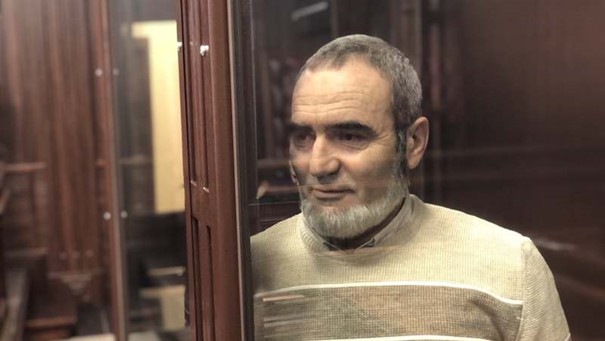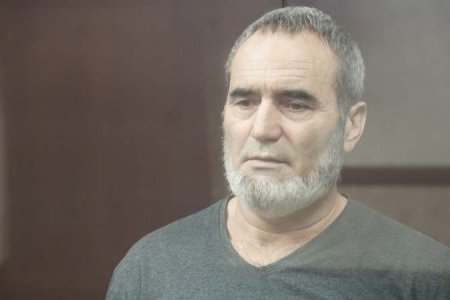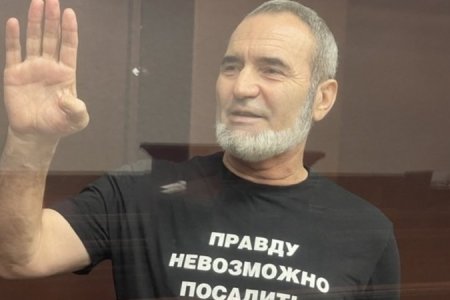
Independent experts have confirmed that Azamat Eyupov’s voice is not on the taped conversation about religion and Russian persecution which Russia’s FSB is using as alleged grounds for a prison sentence of up to 20 years. This should have prompted the immediate release of the 59-year-old veteran of the Crimean Tatar national movement, but has not, with the prosecution and court likely, instead, to rely on the contradictory testimony of an FSB-loyal, although unqualified, ‘expert.
According to Eyupov’s lawyer, Emil Kurbedinov, the official phonographic ‘expert’ was questioned on 23 March during the latest hearing at the Southern District Military Court in Rostov (Russia). He gave testimony which was vague and lacking in specific while also, according to Kurbedinov, demonstrating his lack of experience in providing such expert assessments. Most importantly, his testimony clashed with that of independent experts, whose assessment the defence announced at the same hearing. These independent experts confirmed what the defence has said from the outset, that Eyupov was not at the meeting in question, and it is not his voice on the tape. It is believed that the voice, in fact, belongs to a citizen of Uzbekistan who was living in occupied Crimea, but who has now left the peninsula. “Seemingly, not finding him, the FSB decided to pin criminal charges on somebody else”, Kurbedinov told Crimean Solidarity, adding that Eyupov’s trial is totally illegal.
Eyupov has been imprisoned since 17 February 2021, and the court on 23 March extended his detention for a further two months. The defence is convinced that Eyupov is imprisoned because he refused to give false testimony against other Crimean Tatars. He is not a young man, and has a heart condition which makes it dangerous for him to be in the appalling conditions of a Russian SIZO [remand prison]. He has difficulty even walking up the three flights of stairs to the courtroom.
Eyupov was one of around 20 Crimean Tatars, most of them in their fifties and sixties, who took part in a peaceful picket on Red Square in Moscow on 10 July 2019, calling for an end to ethnic and religious persecution in Russian-occupied Crimea. They held placards reading “Our children are not terrorists”; “The fight against terrorism in Crimea is a fight against dissidents” and “Stop persecution on ethnic and religious lines in Crimea”, together with the photos of four political prisoners whose appeal was to be heard the following day. Although the men simply stood, apart from each other, but in a line, seven were detained and prosecuted under Article 20.2 of Russia’s code of administrative offences with supposed ‘infringement of the established procedure for holding a meeting’. The protest came almost exactly 32 years after Eyupov and other activists from the Crimean Tatar national movement held a large demonstration on Red Square demanding the right to return to their native Crimea after 43 years in enforced exile. That earlier protest was vital in gaining international publicity for the plight of the Crimean Tatars in the Soviet Union.
In 2019, the men were speaking out in support of Enver Mamutov; Rustem Abiltarov; Zevri Abseitov and Remzi Memetov whose sentences of up to 17 years without any crime were upheld, almost unchanged, on 11 July 2019.
Less than two years later, on 17 February 2021, Russia’s FSB came for Azamat Eyupov on identical charges to those against the men whom he had defended. Eyupov had also taken part in many other single-person pickets and flash mobs in support of political prisoners, and also regularly attended political court hearings.
The link between Eyupov’s earlier civic activism and his arrest seems clear and is also typical of Russia’s persecution of Crimean Tatars in occupied Crimea.
Eyupov was added to ‘a case’ which has already resulted in monstrous sentences against three recognized political prisoners from Bilohirsk (Russian Belogorsk): Enver Omerov and his son Riza Omerov, and Aider Dzhapparov. The three were sentenced to 18; 13 and 17 years, respectively, on 11 January 2021, with these sentences upheld by the court of appeal in March 2022. hearings ending in March 2022, with all three . Eyupov was one of six men from different parts of Crimea arrested a month after the initial sentences, after ‘armed searches’ which again targeted civic activists. The armed and masked enforcement officers, as always, illegally prevented lawyers from entering, and in several cases, including that of Eyupov, the ‘prohibited’ religious literature supposedly ‘found’ was planted by the officers.
The fact that it is not Eyupov’s voice is critical since he is accused of the more serious of two charges which have become Russia’s weapon against religious dissidents and civic activists in occupied Crimea. Like the Omerovs and Dzhapparov, Eyupov is accused solely of unproven involvement in the peaceful transnational Muslim Hizb ut-Tahrir organization which is legal in Ukraine and which is not known to have committed any acts of terrorism or violence anywhere in the world. The Russian Supreme Court ruling in 2003 which declared it a ‘terrorist’ organization was deliberately kept secret until it was too late to challenge it, and Russia has never provided any convincing justification for the decision. This is one of the many reasons why the Memorial Human Rights Centre considers all those convicted merely of involvement in Hizb ut-Tahrir, including Eyupov, to be political prisoners. In the case of Crimean Tatar and other Ukrainian Muslims from Crimea, Memorial HRC also points out that Russia is using these prosecutions to try to crush the Crimean Tatar human rights movement and that it is in violation of international law in using its own legislation on occupied territory.
Eyupov is accused of having been the ‘organizer’ of a supposed Hizb ut-Tahrir group (under Article 205.5 § 1 of Russia’s criminal code), as well as under Article 278, of ‘planning to violently seize power’. Neither his ‘search’, nor those of the men arrested earlier, had found any weapons, etc., nor was there any mention, even in the illicitly taped conversations, of any such plans. Memorial HRC has repeatedly pointed to the arbitrary nature of the charges, and the fact that the arguments for the ‘planning to violently seize power’ are essentially copy-pasted from those for the ‘terrorism’ charge under 205.5.
Please write to Azamat Eyupov!
Letters tell him that he is not forgotten and making sure that both the prison staff and Moscow know that their actions are under scrutiny. Letters need to be in Russian, and on ‘safe’ subjects. If that is a problem, use the sample letter below (copying it by hand), perhaps adding a picture or photo. Do add a return address so that he can answer.
Sample letter
Здравствуйте,
Желаю Вам здоровья, мужества и терпения, надеюсь на скорое освобождение. Простите, что мало пишу – мне трудно писать по-русски, но мы все о Вас помним.
[Hi. I wish you good health, courage and patience and hope that you will soon be released. I’m sorry that this letter is short – it’s hard for me to write in Russian., but you are not forgotten. ]
Address
344022, Россия,, Ростовская обл., г. Ростов-на-Дону, ул. Максима Горького, 219, ФКУ СИЗО-1
Эюпову, Азамату Серверовичу, г.р. 1963
Or in English
344022 Russian Federation, Rostov on the Don, 219 Maxim Gorky St, SIZO-1
Eyupov, Azamat Serverovich, b. 1963 ]


